Charles Duchaussois was a French writer who was born on the 27th of January 1940 and who died on the 27th of February 1991. Duchaussois is most noted for his autobiographical novel Flash ou le Grand Voyage .
Born to diplomats, Charles was hit in the eye by shrapnel during a morning air raid when he was 4 months and 8 days old. This left him blind in one eye, a detail often evoked in his novels. In his 20s, he decided to leave for the south of France after getting fed-up with the Île-de-France. After various thefts, frauds, and multiple trips to prison, Charles left for Lebanon to meet a friend. This is where "Flash ou le grand voyage" starts.
It was 1969 at the zenith of the hippie movement, from Marseille to Beirut, from Istanbul to Baghdad, taking long detours in India, by boat, on foot, in car, Charles got closer to Kathmandu. His trip began by accident in Lebanon, with arms and hashish tradings. His destination was Kathmandu. His trip was groundbreaking from a geographical perspective but also from the sheer number of drugs he discovered. He developed a drug addiction, offering the reader not only a look at his exploits but also his challenges. He was medically repatriated to Paris on the 10th of January 1970, after six months of worsening addiction. The end of his trip touches insanity, Charles escaping death several times at the last minute. Upon his return, he recorded the tale of his adventure on 18 magnetic tapes and sent it to Fayard publishing house in December 1970., Insanity, death & excess, it was the decade. This psychedelic novel gives us a clear and sometimes crazy insider's look at hippie wave of the 60s.
After "Flash" : Until November 1970, he struggles with drug addiction, helped by Jocelyne, a French woman he met at Kathmandu. Charles and Jocelyne don't escape from the world of drugs, working odd jobs, raiding Parisian pharmacies, going insane and then to detox. At the beginning of 1971, they moved to Switzerland, to La Chaux-de-Fonds. 3 November 1971, their son Krishna-Romain was born. The name was in honor of a servant Charles had in Kathmandu and a friend of Charles who settled in Kuwait. At the beginning of 1972, Charles wants to travel again (in South America), but Jocelyne wants a stable life to raise Krishna-Romain.
Charles left to go live in Paris. He remarried in 1974 to Christiane, and had a baby girl: V. They separated in 1977. At the end of 1978, tragedy struck, Charles was imprisoned for homicide. Divorced in 1983, he met Fernanda and remarried for the third time in the Paris region. They divorced in 1986.
Charles Duchaussois died of lung cancer 27 February 1991 at the hospital Saint-Michel in Paris.
Monsieur S., funeral director recognized him and let him be entombed in the Valenton intermunicipal cemetery. He rests in an unmarked grave with two brothers at his side.
Romain Gary, born Roman Kacew, was a French novelist, diplomat, film director, and World War II aviator. He is the only author to have won the Prix Goncourt under two names. He is considered a major writer of French literature of the second half of the 20th century. He was married to Jean Seberg.

Alexandre Dumas, also known as Alexandre Dumas père, was a French writer. His works have been translated into many languages and he is one of the most widely read French authors. Many of his historical novels of high adventure were originally published as serials, including The Count of Monte Cristo, The Three Musketeers, Twenty Years After and The Vicomte of Bragelonne: Ten Years Later. His novels have been adapted since the early twentieth century into nearly 200 films.
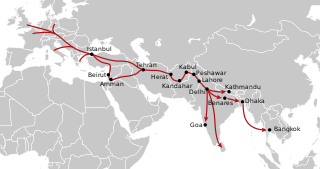
The hippie trail is the name given to the overland journey taken by members of the hippie subculture and others from the mid-1950s to the late 1970s between Europe and South Asia, mainly from Turkey through Iran, Afghanistan, Pakistan, India, to Nepal; an alternative route ran from Turkey to the Levant. The hippie trail was a form of alternative tourism, and one of the key elements was travelling as cheaply as possible, mainly to extend the length of time away from home. The term "hippie" became current in the mid-to-late 1960s; "beatnik" was the previous term from the later 1950s.
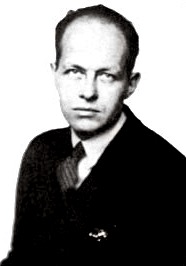
Pierre Eugène Drieu La Rochelle was a French writer of novels, short stories and political essays. He was born, lived and died in Paris. Drieu La Rochelle became a proponent of French fascism in the 1930s, and was a well-known collaborationist during the German occupation.
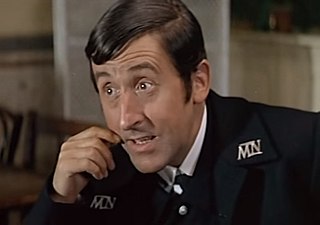
Jean Marcel Lefebvre was a French film actor.

Jean-Marie Gustave Le Clézio, usually identified as J. M. G. Le Clézio, of French and Mauritian nationality, is a writer and professor. The author of over forty works, he was awarded the 1963 Prix Renaudot for his novel Le Procès-Verbal and the 2008 Nobel Prize in Literature for his life's work, as an "author of new departures, poetic adventure and sensual ecstasy, explorer of a humanity beyond and below the reigning civilization".

A poète maudit is a poet living a life outside or against society. Abuse of drugs and alcohol, insanity, crime, violence, and in general any societal sin, often resulting in an early death, are typical elements of the biography of a poète maudit.
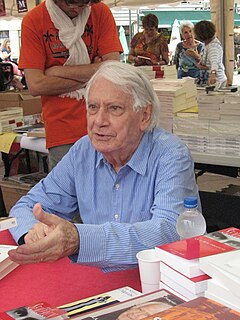
Jorge Semprún Maura was a Spanish writer and politician who lived in France most of his life and wrote primarily in French. From 1953 to 1962, during the dictatorship of Francisco Franco, Semprún lived clandestinely in Spain working as an organizer for the exiled Communist Party of Spain, but was expelled from the party in 1964. After the death of Franco and change to a democratic government, he served as Minister of Culture in Spain's socialist government from 1988 to 1991. He was a screenwriter for two successive films by the Greek director Costa-Gavras, Z (1969) and The Confession (1970), which dealt with the theme of persecution by governments. For his work on the films The War Is Over (1966) and Z (1969) Semprún was nominated for the Academy Award. In 1996, he became the first non-French author elected to the Académie Goncourt, which awards an annual literary prize. He won the 1997 Jerusalem Prize, and the 2002 Ovid Prize.

Jules Romains was a French poet and writer and the founder of the Unanimism literary movement. His works include the play Knock ou le Triomphe de la médecine, and a cycle of works called Les Hommes de bonne volonté . Sinclair Lewis called him one of the six best novelists in the world.
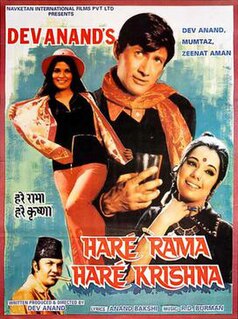
Haré Rama Haré Krishna is a 1971 Indian musical drama film directed by Dev Anand starring himself, Mumtaz and Zeenat Aman. The film was a hit and a star-making vehicle for Zeenat Aman, who played a westernized hippie, and won the Filmfare Best Supporting Actress Award, as well as the BFJA Award for Best Actress. The movie dealt with the decadence of the Hippie culture. It aimed to have an anti-drug message and also depicts some problems associated with Westernization such as divorce. It was influenced by the 1968 American psychedelic film Psych-Out.

Henry de Jouvenel des Ursins was a French journalist and statesman. He became the French High Commissioner in Syria and Lebanon on 23 December 1925 until 23 June 1926.

Vénus Khoury-Ghata is a renowned French-Lebanese poet and writer.

Franz Hellens, born Frédéric van Ermengem was a prolific Belgian novelist, poet and critic. Although of Flemish descent, he wrote entirely in French, and lived in Paris from 1947 to 1971. He was nominated for the Nobel Prize in Literature four times.
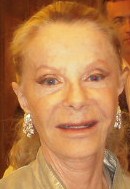
Laetitia Marie Madeleine Susanne Valentine de Belzunce d'Arenberg, known as Laetitia d'Arenberg, is a French Uruguayan businesswoman.

Simone Le Bargy,, born Pauline Benda but better known by her stage and pen name, Madame Simone, was a French actress and woman of letters.
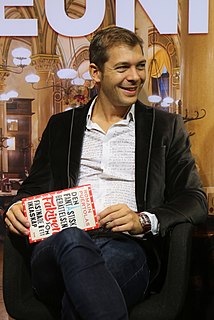
Romain Puértolas is a French author. He is most noted for the bestselling French novel The Extraordinary Journey of the Fakir Who Got Trapped in an Ikea Wardrobe, which has been translated into English and has become an international bestseller sold in 36 nations. This novel sold over 100,000 copies in France by August 2014 and topped French bestseller lists.
Alexandre Leblanc de Ferrière, died after 1845, was an 18th–19th-century French playwright, journalist, printer, publisher and writer.

Henri Bachelin was a 20th-century French writer

Louis Énault was a French journalist, novelist and translator. He sometimes used the pseudonym "Louis de Vernon".

Impressions, souvenirs, pensées et paysages pendant un voyage en Orient, 1832-1833, ou Notes d'un voyageur, shortened to Voyage en Orient, is a travel journal written by Alphonse de Lamartine. This book narrates Lamartine’s journey to several Middle Eastern regions now known as Turkey, Lebanon, Israel, and Syria but also South Eastern European countries such as Cyprus, Greece, and Serbia. The book was published in 1835, and is divided in four volumes, comprising a total of 1260 pages.